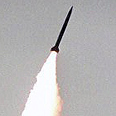
S-300 missile
צילום: AFP
Iran to top Netanyahu's agenda in Moscow
Ahead of talks with Medvedev, PM tells cabinet 'Israel believes that heavy pressure must be applied on Iran, above all very severe sanctions.' Russia's Security Council: No reason to halt sale of S-300 missiles to Tehran
Israeli Prime Minister Benjamin Netanyahu will push for urgent "crippling sanctions" against Iran over its nuclear program during talks in Moscow on Monday with Russian President Dmitry Medvedev.
"We will discuss a number of issues -- first and foremost, the Iranian issue," Netanyahu said on Sunday at the weekly Israeli cabinet meeting, before flying to Moscow.
"Israel believes that heavy pressure must be applied on Iran, above all very severe sanctions, which were referred to by the US secretary of state as 'crippling sanctions'," he said.
Iran's announcement this week that it had begun making higher-grade nuclear fuel has heightened Western suspicions it is seeking atomic weapons. Tehran denies having hostile designs.
But Israel, seeing a mortal threat, has hinted it could attack Iran's nuclear facilities preemptively if it deems international diplomacy a dead end.
The United States, Britain, France and Germany are mulling a fourth round of UN sanctions on Iran to persuade it to rein in its uranium enrichment.
Asked what Netanyahu meant by "crippling sanctions", an aide said: "Sanctions that target Iran's refined petroleum imports." While it is the world's fifth-largest oil exporter, Iran lacks domestic refineries and imports some 40 percent of its gasoline.
Russia, which has commercial ties to Tehran, has in the past rejected sanctions that would target the Iranian energy sector. But after Iran announced it was enriching uranium to 20 percent purity, Russia indicated it would not oppose tougher sanctions.
China, a major consumer of Iranian crude, remains the veto-wielding Security Council power most likely to oppose energy sanctions. Some Israeli analysts say Moscow's consent on the issue would help pressure Beijing into closing ranks.
'There is a signed contract'
For now, officials involved in the six-power negotiations expect new sanctions to stop short of hitting energy assets.
Proposed sanctions include blacklisting Iran's central bank and other big banks, adding more Iranian individuals to a travel ban list, expanding an asset freeze to include more Iranian companies and imposing an arms imports ban.
Netanyahu last visited Russia in September on a secret one-day trip that was leaked to the media.
Israeli reports said he had flown to Moscow on a private plane to voice concern over the possible sale of Russian S-300 anti-aircraft missiles to Iran. The S-300 could hamper any air strikes on Iran by Israel, which is assumed to have the region's only atomic arsenal.
But a leading member of Russia's Security Council said ahead of Netanyahu's visit that Moscow saw no reason to halt the sale.
"There is a signed contract (to supply S-300 missiles) which we must implement, but deliveries have not started yet," Vladimir Nazarov, deputy secretary of Russia's Security Council secretary, told Interfax news agency in an interview.
"This deal is not restricted by any international sanctions, because the talk is about deliveries of an exclusively defensive weapon," he said.
Netanyahu said Israel also wants Russia to help speed up US-led efforts to renew peace talks with the Palestinians that have been suspended since 2008.
Palestinian President Mahmoud Abbas insists that Israeli settlement expansion in the West Bank and east Jerusalem must be halted before negotiations resume. He rejected as insufficient a limited 10-month construction freeze Israel ordered in November.
Russia is interested in expanding its fleet of Israeli-made spy drones, having seen neighboring Georgia use them against Russian forces in a 2008 war.










